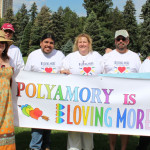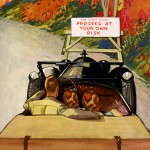The number of people who call themselves polyamorous or say they have an open relationship is on the rise. The media is in a frenzy and local groups are growing like crazy in areas that two years ago had little to no groups or at least little activity. ![j0178802[1]](https://lovingmorenonp.wpengine.com/blog/wp-content/uploads/2011/01/j01788021-300x200.jpg) This growth appears to be driven by the twenty something crowd. This is not to say polyamory is not growing among the older generations as well, it is but the biggest influx is people under thirty. We are thrilled to see the interest and exploration growing for so many people and especially to see people in their early twenties exploring open relationships, poly and many other alternative sexual and relationship choices.
This growth appears to be driven by the twenty something crowd. This is not to say polyamory is not growing among the older generations as well, it is but the biggest influx is people under thirty. We are thrilled to see the interest and exploration growing for so many people and especially to see people in their early twenties exploring open relationships, poly and many other alternative sexual and relationship choices.
We have important questions about this trend and want your honest feedback.
Why are so many people exploring polyamory at younger and younger ages? Are the twenty something crowd really polyamorous? Are they really interested in forming romantic loving committed relationships with multiple partners? Or are they simply opting to sleep around without commitment and calling it polyamory as a vehicle for rebellion and nonconformity? Will they sow their wild oats and in five years opt for monogamy? Or are they embracing a deeper need to expand love and commitment beyond tradition as a life choice?
We are asking the question for comment, we want to hear from you. What is your opinion of the younger generation embracing polyamory?
If you are willing, let us know your age when you comment.








I feel the reason we are seeing more young people opening living in the Poly lifestyle, is there is a lot more open communication about sex and love. We have encourage our daughters to be open to sex, it is not bad. There is a lot more open and honest conversations about it.
I am 42. Have been openly Poly for the last 10 years
This isn’t a one-answer question. There are a lot of varied factors weighing in together to contribute to this phenomena.
The debate on gay marriage is part of it. People (of all ages) have had to examine what Marriage itself means. The increased acceptance of alternate sexuality in general (it’s still a work in progress, to be sure, but there is a noticeable increase in acceptance) gives people reason to think about some very basic questions. Why do we define marriage this way? Are other definitions equally legitimate? The more deeply such questions are pondered, the more likely some will identify as polyamorous.
Hand in hand with that, the freedom of information has a lot to do with that. What was once taboo, and whispered behind closed doors, is now out in the open. The more chances a person has to connect with another like minded individual, the more likely they are to conclude they are not a freak for being outside the norm they were raised in. People are more apt to identify themselves as polyamorous if they are supported by others who do the same.
Economics is part of it. A two-income family isn’t always able to make ends meet anymore, so more and more people need to add an additional income to the family. Increased sharing of living space will cause an increase in non-traditional relationships. When you share living space, when someone is truly part of the household, emotional bonds will naturally develop. In some cases, these bonds will be examined and explored, and some of those will lead to polyamory.
In all these cases, the younger adults are more likely to be in these situations, and are more likely to be open to other possibilities. It is far easier for a new couple to explore adding a third (or more) when passion and energy are still full, and responsibilities are (comparatively) low. A couple that has been married for two decades is less likely to contemplate the option.
I’m definitely of the opinion that a person’s sexuality is apt to fluctuate throughout their lifetime, especially when you’re young, so I wouldn’t be surprised to see that someone who identified as poly at one point later decided to be monogamous. Younger generations are also more likely to be accepting and tolerant of previously unacceptable ideas – the same goes for interracial marriage, gay marriage, etc. I wouldn’t be surprised if that were the case.
As for trying to decide if other people are “really” polyamorous or “really” looking for recreational sex, I think it’s more a sign that young people are rejecting the notion that they have to identify themselves at all, that they have to be restricted to a single sexual-romantic identity.
I was so grateful when I stumbled across the articulation of the polyamory concept. My first thought was that “There’s a word for that!?! People can really do that?! AMAZING!.” It was a ‘coming home’ feeling. I feel as if I’ve been wired this way my entire life. It’s a fundamental core to who I am as a person. I believe there are a plethora of different types of relationships you can cultivate with different people and I enjoy the freedom of expression polyamory allows for. An important aspect of poly for me has been the honesty, openness, and above all else – the development of my person. I identified as poly on a theoretical level when I was 24, became actively poly when I was 25 and will never go back to monogamy.
So at 29 now I have been in a very committed triad for two and a half years now, what brought me and my wife into polyamory originally was sexual expirimentation. However as we discovered that we were looking for more comitment and more connection that just casual sex we fell more into what the poly ideas were.
As for what brings more young people into it I suspect it is as much this as it is the slow easing of social as well as self imposed self stigmas as you grow up and start to decide for your self what is truly okay and what it is you want. Young people having surrounded them selves with a supportive social structure by that age (hopefully) and the will to determine what it is that makes them happy instead of subscribing solely to the previously knows societal norms will begin to experiment, and with the easy access to the internet as well they will find organizations like this that will help them to put a name to what it is that they are wanting or feeling.
I’m 28, with girlfriends of 27 and 26. I have a loving, committed, long term relationship with both.
> Why are so many people exploring polyamory at younger and younger ages?
A combination of factors.
I don’t think you can underestimate the seismic social shift that’s happened with regards to attitudes about sex. It simply doesn’t carry the weight or the stigma that it did with our parents. We’ve never known a time before good, effective birth control. We know enough about STI’s that we feel we can mitigate the risk (or in youthful fashion, ignore the risk). Universal access to sexualized media and porn mean that it’s not a mysterious evil thing. “Slut” still carries a stigma, but it’s telling how much more a girl has to do to earn that label than she did just a few decades ago.
But there’s also this: when my grandfather turned 18, he got a job, got married, and was soonafter starting a family, buying a house, and doing everything else that marks “adulthood”. In 2010, the average age of first marriage is somewhere in the late 20’s. And in the liberal urban areas where poly thrives the most, it’s probably closer to 30. The 20’s is a stage of life that just didn’t exist a generation or two a go. It’s a stage that includes most of the freedoms and privileges of adulthood without the responsibilities like family and mortgage. So it’s a life stage where you can afford to be a little hedonistic before “settling down”.
> Are the twenty something crowd really polyamorous?
But on this I’d have to say “no”.
> Are they really interested in forming romantic loving committed relationships with multiple partners? Or are they simply opting to sleep around without commitment and calling it polyamory as a vehicle for rebellion and nonconformity? Will they sow their wild oats and in five years opt for monogamy? Or are they embracing a deeper need to expand love and commitment beyond tradition as a life choice?
As I said above, I’ve got a loving committed “V” type relationship. But in our experience, we’re something of a minority in the community in our age group. Most are pursuing casual flings – friends-with-benefits type relationships, or maybe they have a marriage-track “primary” partner with whom they have an open relationship and treat polyamory as a way to have sex-on-the-side.
There’s exceptions – I’m one after all, and I know a few others. But in most cases, I’d say that most see “polyamory” as a convenient label that describes a period of quasi-hedonism before “settling down” into a more conventional sort of lifestyle down the road. That they do it at all emerges more from “because I can” than a genuine desire for multiple loves and commitments.
At least, that’s my take.
I’m 26 and first realized that I was polyamorous when a boyfriend cheated on me (and subsequently dumped me for being insufficiently jealous), and I realized that it didn’t really bother me that he’d gone and gotten involved with someone else, what bothered me was the fact that he was (and probably still is) a lying douchebag.
Shortly thereafter, I met my current primary partner, and we’ve been together nearly 4 years. There is an aspect of permanence that I think is made possible by the fact that we give each other license to meet, become involved with, have sex with, and love other people.
I don’t really view my relationships as long term commitments, since all of my relationships prior to the present have been short and fierce. I’ve come to a point in my life where I just want to have the most authentic relationships possible with everyone I meet. Sometimes that involves sex. Sometimes it involves platonic friendship. Sometimes you meet someone and fall instantly in love with them, but there isn’t a sexual aspect to the relationship. The authenticity is the point for me, not the being allowed to fall in love or have sex with as many people as I want whenever I want it.
I’m in my late thirties, married, have a long-term girlfriend, and date others.
Until about six months ago I was in a rather drama-ridden relationship with a girl who is in her early twenties and a poly activist. My sense of her and of some of the younger people whom my current girlfriend dates is that the early 20s poly-identified are mostly just sussing out relationship styles. They have not decided that non-monogamy is a lifestyle choice for them, but they are pretty sure that monogamy does not make any emotional sense where they are right now.
Considering the illuminating arguments made in “Sex at Dawn” about multi-male-multi-female mating being the prehistoric native state for humans, I think the interesting question isn’t why younger people are identifying as poly in such numbers — the interesting question is whether it sticks. I would hazard that all but the most insecure of the sexually active early-20s crowd find monogamy stifling. What is new is that now is probably the first time since the invention of the plough that there is a generation which can openly say so, live so, and face the emotional consequences without severe institutionalised punishment.
I want to read the longitudinal study results in ten years!
I have been poly my whole adult life. I am 42 now, and have been involved with my husband since I was 23, and we were always poly. Monogamy never made sense to me. Poly has definitely “stuck” with me. Whether it is a permanent choice or a “phase” will probably vary for each individual. I don’t think you can really generalize unless you do actual long-term research on the topic. And it would be interesting to compare whether polyamory “sticks” more or less with people who have been monogamous for most of their lives and then try polyamory in their 30s, 40s or beyond.
it is likely that many of the young people today are coming from broken homes – homes of divorce, or single parents, or simply parents who do not get along. there are a lot of people growing up who see marriage as something that doesn’t work, or at least, doesn’t work well. studies have shown that the many, many single parents out there, while having it rough in many other ways, are nowhere near as unhappy, or out of control with their lives, as young parents who ARE married (please send me a message if you want references to these studies). that was a shocker, at first… and then the “d’uh” moment hit.
i am hopeful that the younger generations will continue this movement towards questioning monogamy and matrimony. it is a hopeful thing for the future, to know that alternative relationships are normalizing in our country. the biggest enemies – religion and political conservativism – have counted on the unquestioning devotion of generations. it seems that the next generations are no longer prone to just doing or believing what they are told without exploring the answers for themselves – and they are discovering that things are not like what they have been told.
in some ways, the media does help with TV shows that have more open arrangements between people as well, just for the sake of getting some much-needed conversations to take place!
the movement is growing. we need the stamina of the young to keep that momentum going! plus they are all so very cute, and i want one. or two. yummy! good boys and girls!
I agree that the big question is where will people be in say ten years. One reason we posted the question is my own personal experiences. I am 46 and my first boyfriend was at age 13 and it was open and poly. I of did not realize it at the time. At fifteen I was involved in a polyamorous network though again I was not entirely conscious this what we were doing. My boyfriend was bi and he was involved with my best friend who was male. I ended up involved with both guys, my boyfriends former girlfriend and there were at least two other people involved. We all spent all our time together and a lot exploring love, connection and sex. All of them are now monogamous including my bi boyfriend who realized he was really gay. Of the ones I am in touch with, they are freaked out by what I do with Loving More. My first BF at 13 is still a good friend and on his sixth marriage but tells me all the time how weird I am for poly.
Perhaps if there were the kind of information and acceptance when I was fifteen or even twenty things might be different for all those wonderful people I loved back then. I still feel much appreciation and love for all of them to this day.
Robyn Trask
I’m 27. I first found out about and purchased Loving More Magazine in 2003 or 2004. I began a multi-partner relationship in 2002 when my partner and I of 7 months partnered with a third individual. The three of us made a life commitment to one another, called ourselves the Triad, and kept our relationship secret from just about everyone. I was 18, my partners 18 and 25. It was another year or two before I found out the word polyamory existed, before I found out there was such a thing, a community. And what a relief to find that out. It was a big help just to know it was out there. I started reading more about it, had some issues of Loving More sent to the house. I felt included. The only thing was, I noticed no one in any of the pictures in Loving More – or anywhere else I was reading and finding out about polyamory – were in their 20’s and teens. While I could see why my age group wasn’t in the majority, it didn’t help to find no one else my age when discovering the polyamory community for the first time. Of course it’s a wonderful thing more young people are beginning to identity as such. It means a couple of things. Teens and people in their twenties have more access and options as far as support, the exposure will make these relationships less taboo over time, and the latest generation is more open to new models of family life. These are all positives. I’m sure the “open relationship” facebook generation could be seen as devaluing the definition of polyamory. But each generation is allowed their own definition, their own movement, their own polyamory. And we should be happy they’re open to it and that the concept is reaching them at all. I wish I had had a community of peers when I first found the community of polyamory, and I’m glad today’s teens have more of that.
As a 25 year old woman, here is why my husband (24 years old) and I are poly:
I grew up in a city of millions. My husband grew up in a city of under ten thousand. We have had very different experiences when it comes to relationships. I was the first person my husband had ever been in a serious relationship with. I want him to have the ability to experience how it feels to love and be loved by another man or woman. I have been truly loved by very few of the people I have ever had a romantic relationship and want the option to share the love I have in my heart.
Because there are many ways to love and be loved by others, my husband and I feel that the love we feel for others is nothing to be ashamed of, and rather something to be happy about and proud of.
While we often flirt, cuddle, etc with someone when one of us is not around, we also tend to be interested in the same people, and don’t have much interest in having a relationship or sex with someone when the other spouse is not involved.
I’m 27 and have gone back and forth over the past 5 years, sometimes identifying as poly and other times committing to a monogamous relationship.
For me personally, I feel that I never stop loving someone I’ve had a deep connection with. And yet, my partners’ (“justifiable”) jealousy in a monogamous relationship always seems to keep me from seeing and even speaking to an ex. I’m not beyond jealousy myself, but I feel that times are changing and with them, we need to start changing the way we think.
I relate it to racism or homophobia in the sense that our rigid beliefs about polyamory/loving other ppl/appropriate relationship behavior create a bias that affects the way we feel toward one another and the way we treat each other. It justifies our rage, which justifies our response (hatred, agression, etc..).
But why not love and let love? What harm can come of that?
I am 20, about to turn 21 in June and I think its really just the trend of rebelling for the most part among people my age. I have identified as polyamorous since I was 17
Even back then it was considered very weird among my peers for me to be that way, so I think the influx we’ve scene in recent years is more of a fad, an experiment.
I doubt the numbers will keep increasing as the years go by, polyamory isn’t for everyone of course.
I personally don’t know how being poly will factor into my life later, I doubt I have the experience to predict such but I will say that I personally come into it with honest intentions, that I tried monogamous relationships and they did not work because I sought more then one serious partner.
I’m approaching my mid-30s and have been in a m/m/m triad for over two years now. In my twenties, I was pretty much convinced you either had to be monogamous, or sleeping around like a “slut”.
If I had a clue there was some middle ground—honest, open, loving polyamory—I probably could have saved myself a decade and half of frustration, not to mention several failed relationships. Oh if only I had a time machine!
I’m 24 now and I’ve never been monogamous. My first relationship from 16 (till 19) was non-monogamous and I’ve called myself poly since I learned the word when I was 18 or so.
I’ve noticed an increase in openly poly people my age over that time. I was really active in the UK National Union of Students LGBT campaign. During NUS LGBT conferences different groups hold caucuses of people who identify as belonging to a particular group (such as disabled students, bisexual students, mature students etc). Initially discussions of polyamory at these events were met with ignorance, confusion and not a little hostility. By my last conference before graduating, an informal poly caucus was one of the best attended caucuses present. It took some fairly active awareness raising and willingness to debate but within that circle things have definitely improved. We’ve been holding a lot of workshops and debates as well as making zines and writing articles.
Increased visibility and access to information gives young poly people a word to describe what they might already have been doing/interested in, a lot of resources to help them through the initial exploration and a feeling that they’re not the only ones.
Also, I don’t think that young poly people are any more likely to be “not really poly” than those who come to it later in life.
I am 29, and I have been poly since my first real relationship, which started at age 18. When a person is young, asking if they’re “really” polyamorous is like asking if they’re “really” monogamous or “really” anything; it will take some life experience for them to figure it out. For me and my poly friends my age, it’s mostly about good communication and living from the heart instead of following a social script. “Poly” means a lot of things, but my partner and I identify that way because we support each other’s freedom to express love.
I’m 22 and have been involved in a polyamorous relationship for about 15 months. I was introduced to it about 19 months ago, when my now-girlfriend and I were just starting to get to know each other. She had a boyfriend at the time (and they’ve always been in an open relationship) and we’ve since turned into a triad, as it turns out that he and I also get along rather well.
I’m not sure whether poly’s a… part of my true self or whatever, but it describes my current situation. I’d most likely be happy with having the triad as a polyfi arrangement or — if things fall apart with my current two dear ones — (serial) monogamy is something I’d at least consider again.
I like the current arrangement, though. I like hearing about our girlfriend’s experiences with others, as she’s all happy and excited and enthusiastic… knowing she’s happy is good, plus it sort of gets reflected back to our boyfriend and me. I also seem to be pretty much incapable of jealousy, which probably helps.